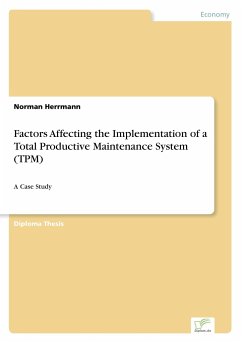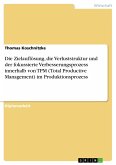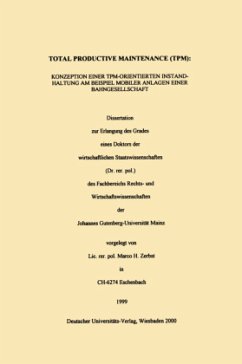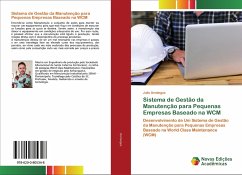Diploma Thesis from the year 2004 in the subject Business economics - Business Management, Corporate Governance, grade: 1,0, University of Applied Sciences Aalen (unbekannt), language: English, abstract: Inhaltsangabe:Abstract:
Modern manufacturing requires that organisations that want to be successful and to achieve world-class manufacturing must posses both effective and efficient maintenance. One approach to improve the performance of maintenance activities is to implement a Total Productive Maintenance (TPM) system.
The aim of this dissertation is to prove that the introduction of a TPM system is by no means an easy task, because there are several barriers that encumber the implementation process, the driving forces to success have to be identified and well understood, and a process of organisational change has to be managed successfully.
The study analyses impediments, barriers and obstacles to the implementation procedure and discovers key success factors concluding with a conceptual framework for a successful TPM implementation.
The dissertation also examines the challenge of managing change within the TPM context and identifies that such a TPM journey requires employee and management commitment to be successful.
Through a case study of implementing TPM in an automotive supplier company, the practical aspect within and beyond basic TPM theory and problems encountered during the implementation are discussed and analysed.
The paper concludes that the implementation of TPM is definitely not an easy task, which is considerably burdened by organisational, behavioural and other barriers, and necessitates the difficult mission to change peoples mindsets from a traditional maintenance approach.
Inhaltsverzeichnis:Inhaltsverzeichnis:
Title page01
Declaration and Word Count02
Abstract03
Acknowledgements04
Table of contents05
List of figures09
CHAPTER 1INTRODUCTION10
1.1Importance of TPM10
1.2Problem statement and objectives11
1.3Research methods12
1.4Structure of the study13
CHAPTER 2LITERATURE REVIEW14
2.1Defining TPM14
2.2Basic concept14
2.3Performance measurement17
2.4New roles of operators and maintenance staff19
2.5The JIPM s 12 steps to implement TPM21
2.6The connection between TPM and TQM23
2.7TPM in the view of change25
CHAPTER 3METHODOLOGY29
3.1Company profile and TPM background29
3.1.1General information about the company29
3.1.2CME: The plant of the focus of this study30
3.2Explanation, justification and limitations of selected methods32
3.2.1Focus group discussion32
3.2.1.1Data collection procedure33
3.2.1.2Data evaluation34
3.2.2Participant observation35
3.2.3Document analysis36
CHAPTER 4FINDINGS AND ANALYSIS37
4.1Impediments to the implementation of TPM37
4.1.1Behavioural barriers37
4.1.2Organisational barriers41
4.1.3Other obstacles and barriers45
4.2Key success factors for implementing TPM49
4.2.1Management commitment49
4.2.2Training and Education50
4.2.3Communication51
4.2.4Award and recognition52
4.2.5TPM Committee53
4.2.6Measures of performance53
CHAPTER 5CONCLUSIONS56
5.1Assessment of research objectives56
5.2Implications of this study57
5.3Limitations and suggestions for further research59
References60
Bibliography63
Appendices64
AOrigin and diffusion of TPM65
BShort Statement of Learning66
CFocus group discussion guide67
DFirst page of focus group transcript73
ECompany contacts74
Hinweis: Dieser Artikel kann nur an eine deutsche Lieferadresse ausgeliefert werden.
Modern manufacturing requires that organisations that want to be successful and to achieve world-class manufacturing must posses both effective and efficient maintenance. One approach to improve the performance of maintenance activities is to implement a Total Productive Maintenance (TPM) system.
The aim of this dissertation is to prove that the introduction of a TPM system is by no means an easy task, because there are several barriers that encumber the implementation process, the driving forces to success have to be identified and well understood, and a process of organisational change has to be managed successfully.
The study analyses impediments, barriers and obstacles to the implementation procedure and discovers key success factors concluding with a conceptual framework for a successful TPM implementation.
The dissertation also examines the challenge of managing change within the TPM context and identifies that such a TPM journey requires employee and management commitment to be successful.
Through a case study of implementing TPM in an automotive supplier company, the practical aspect within and beyond basic TPM theory and problems encountered during the implementation are discussed and analysed.
The paper concludes that the implementation of TPM is definitely not an easy task, which is considerably burdened by organisational, behavioural and other barriers, and necessitates the difficult mission to change peoples mindsets from a traditional maintenance approach.
Inhaltsverzeichnis:Inhaltsverzeichnis:
Title page01
Declaration and Word Count02
Abstract03
Acknowledgements04
Table of contents05
List of figures09
CHAPTER 1INTRODUCTION10
1.1Importance of TPM10
1.2Problem statement and objectives11
1.3Research methods12
1.4Structure of the study13
CHAPTER 2LITERATURE REVIEW14
2.1Defining TPM14
2.2Basic concept14
2.3Performance measurement17
2.4New roles of operators and maintenance staff19
2.5The JIPM s 12 steps to implement TPM21
2.6The connection between TPM and TQM23
2.7TPM in the view of change25
CHAPTER 3METHODOLOGY29
3.1Company profile and TPM background29
3.1.1General information about the company29
3.1.2CME: The plant of the focus of this study30
3.2Explanation, justification and limitations of selected methods32
3.2.1Focus group discussion32
3.2.1.1Data collection procedure33
3.2.1.2Data evaluation34
3.2.2Participant observation35
3.2.3Document analysis36
CHAPTER 4FINDINGS AND ANALYSIS37
4.1Impediments to the implementation of TPM37
4.1.1Behavioural barriers37
4.1.2Organisational barriers41
4.1.3Other obstacles and barriers45
4.2Key success factors for implementing TPM49
4.2.1Management commitment49
4.2.2Training and Education50
4.2.3Communication51
4.2.4Award and recognition52
4.2.5TPM Committee53
4.2.6Measures of performance53
CHAPTER 5CONCLUSIONS56
5.1Assessment of research objectives56
5.2Implications of this study57
5.3Limitations and suggestions for further research59
References60
Bibliography63
Appendices64
AOrigin and diffusion of TPM65
BShort Statement of Learning66
CFocus group discussion guide67
DFirst page of focus group transcript73
ECompany contacts74
Hinweis: Dieser Artikel kann nur an eine deutsche Lieferadresse ausgeliefert werden.








